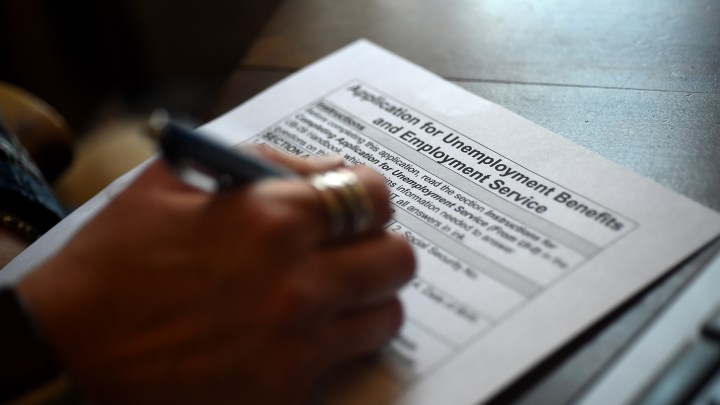
Extra $300 in federal jobless benefits is making a difference, but is it enough?
Extra $300 in federal jobless benefits is making a difference, but is it enough?

After months of getting by just on state benefits, some of the nearly 16 million people who are receiving unemployment benefits have started getting an extra $300 a week from the federal government.
Congress and former President Donald Trump approved the additional money — which is half of what people were getting in the spring and early summer — just before the end of the year, as part of the last COVID-19 relief package.
“It’s not as good as the $600, obviously, but it’s better than nothing,” said Lois Prew, 50, who has been on unemployment since March, when she was laid off from her part-time job as a dishwasher at an inn.
Since the first round of supplemental federal unemployment benefits expired over the summer, Prew has been surviving on just $267 a week in state unemployment benefits.
“When I was only getting the state benefits, we really couldn’t pay the bills at all,” Prew said. “Now, with the $300, I can afford to pay bills, but I have to decide which bills am I going to pay, which are gonna wait.”
When her first unemployment check with the extra $300 in it arrived in early January, she sent most of it straight to the city of Pittsfield, Massachusetts, where she lives, to catch up on her property taxes. Same with the second one. Next, she is planning to focus on paying down her water and sewer bills, which are also overdue.
“I’m anxious because I have to decide which bills to pay, and when, and how much,” Prew said. “At the same time, though, I’m grateful that the $300 is there.”
The extra $300 in Federal Pandemic Unemployment Compensation, or FPUC, more than doubles Prew’s weekly unemployment checks. That’s true for many people around the country. In more than a dozen states, the average weekly unemployment benefit is right around the federal poverty line for a one-person household — about $245 a week, or just under $13,000 a year.
“What we know is that the $300 plus the basic benefit is in a position to keep millions of people out of poverty,” said Andrew Stettner, a senior fellow at The Century Foundation. “It will mean that unemployment is not a poverty-level benefit … that most people are going to be able to not be facing a crisis, being able to meet most of their minimum needs.”
Many people have not been able to cover their most basic expenses since the $600 a week in supplemental federal unemployment benefits expired at the end of July. Since the summer, more than 8 million people have fallen into poverty, according to research out of the University of Chicago and University of Notre Dame.
“The $600 payments were literally keeping people from starving,” said Trevon Logan, an economics professor at Ohio State University.
That boost in unemployment benefits was especially critical for people of color, who have been more likely to lose jobs or income during the pandemic. It also helped the economy.
“The $600 payments … were one of the things that caused a bit of an uptick in economic activity in the third quarter of 2020,” Logan said. “Will $300 payments help? Certainly it’s better than nothing. But it’s not necessarily as good as $600.”
That is how Courtney Henley feels.
Before the pandemic, she worked as an event planner in Brooklyn, New York. The amount of money she gets in Pandemic Unemployment Assistance alone, “let’s just say it’s not livable,” Henley said.
When she was getting the additional $600 a week last spring and summer, Henley was able to cover all her expenses and even save a little money. But after that expired, she started to fall behind on her bills.
“I didn’t have enough to stay on top of everything,” she said.
Since the beginning of the year, Henley has received two unemployment checks with the extra $300, and she’s been using the money to start to catch up.
But, “$300 extra in New York is not enough, because we are such a high-cost-of-living state,” she said. “It’s all going to basic expenses. It goes to bills, food, cat food, that’s about it.”
There’s no going out for pizza. No savings. Nothing left over.
There’s a lot happening in the world. Through it all, Marketplace is here for you.
You rely on Marketplace to break down the world’s events and tell you how it affects you in a fact-based, approachable way. We rely on your financial support to keep making that possible.
Your donation today powers the independent journalism that you rely on. For just $5/month, you can help sustain Marketplace so we can keep reporting on the things that matter to you.


















